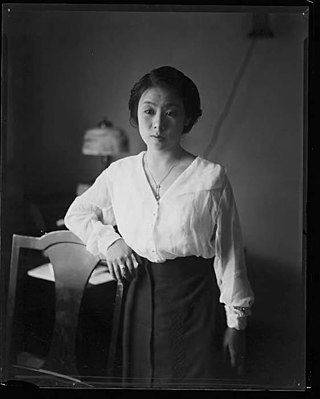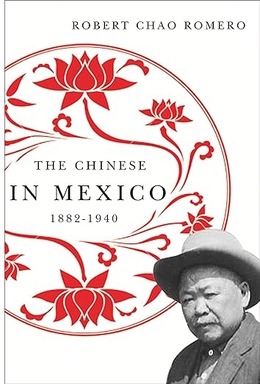
The Chinese Exclusion Act was a United States federal law signed by President Chester A. Arthur on May 6, 1882, prohibiting all immigration of Chinese laborers for 10 years. The law made exceptions for merchants, teachers, students, travelers, and diplomats. The Chinese Exclusion Act was the first major U.S. law ever implemented to prevent all members of a specific national group from immigrating to the United States, and therefore helped shape twentieth-century race-based immigration policy.

The Geary Act was a United States law that extended the Chinese Exclusion Act of 1882 by adding onerous new requirements. It was written by California Representative Thomas J. Geary and was passed by Congress on May 5, 1892.

The Mexican Repatriation is the common name given to the repatriation, deportation, and expulsion of Mexicans and Mexican Americans from the United States during the Great Depression between 1929 and 1939. Estimates of how many were repatriated, deported, or expelled range from 300,000 to 2 million.
Asian immigration to the United States refers to immigration to the United States from part of the continent of Asia, which includes East Asia, South Asia, and Southeast Asia. Asian-origin populations have historically been in the territory that would eventually become the United States since the 16th century. The first major wave of Asian immigration occurred in the late 19th century, primarily in Hawaii and the West Coast. Asian Americans experienced exclusion, and limitations to immigration, by the United States law between 1875 and 1965, and were largely prohibited from naturalization until the 1940s. Since the elimination of Asian exclusion laws and the reform of the immigration system in the Immigration and Nationality Act of 1965, there has been a large increase in the number of immigrants to the United States from Asia.
Asian pride is a term that encourages celebration of Asian ethnicity and culture, with various interpretations and origins. In international relations, it can involve advancing Pan-Asianism and critiquing the West. In the United States, it has roots in counter culture, rejecting stereotypes and empowering Asian Americans. The term gained modern use through hip hop culture, promoting a positive stance on being Asian American. The phrase "Got Rice?" emerged as a symbol of cultural identity and pride, often tied to Asian Pride. It humorously references rice as a staple food in Asian cultures. The term was adopted in T-shirt campaigns and seen as a way for Asian Americans to define their identity and counter stereotypes.
Judy Yung was a historian and professor emerita in American Studies at the University of California, Santa Cruz. She specialized in oral history, women's history, and Asian American history. She died on December 14, 2020, in San Francisco, where she had returned in retirement.

Asian American history is the history of ethnic and racial groups in the United States who are of Asian descent. The term "Asian American" was an idea invented in the 1960s to bring together Chinese, Japanese, and Filipino Americans for strategic political purposes. Soon other groups of Asian origin, such as Korean, Indian, and Vietnamese Americans were added. For example, while many Chinese, Japanese, and Filipino immigrants arrived as unskilled workers in significant numbers from 1850 to 1905 and largely settled in Hawaii and California, many Vietnamese, Cambodian, and Hmong Americans arrived in the United States as refugees following the Vietnam War. These separate histories have often been overlooked in conventional frameworks of Asian American history.
Evelyn Seiko Nakano Glenn is a professor at the University of California, Berkeley. In addition to her teaching and research responsibilities, she served as founding director of the university's Center for Race and Gender (CRG), a leading U.S. academic center for the study of intersectionality among gender, race and class social groups and institutions. In June 2008, Glenn was elected president of the 15,000-member American Sociological Association. She served as president-elect during the 2008–2009 academic year, assumed her presidency at the annual ASA national convention in San Francisco in August 2009, served as president of the association during the 2009–2010 year, and continued to serve on the ASA governing council as past-president until August 2011. Her presidential address, given at the 2010 meetings in Atlanta, was entitled "Constructing Citizenship: Exclusion, Subordination, and Resistance", and was printed as the lead article in the American Sociological Review.
Nativism is the political policy of promoting or protecting the interests of "native-born" or established inhabitants over those of immigrants, including the support of anti-immigration and immigration-restriction measures. Despite the name, and in the US in particular, this position is usually held by the descendants of immigrants themselves, and is not a movement led by Indigenous peoples, as opposited to Nativists in Europe who are descended from native peoples such as Celts, Anglo-Saxons or Norsemen.
The Pacific Coast race riots were a series of riots which occurred in the United States and Canada in 1907. The violent riots resulted from growing anti-Asian sentiment among White populations during the late 19th and early 20th centuries. Rioting occurred in San Francisco, Bellingham, and Vancouver. Anti-Asian rioters in Bellingham focused mainly on several-hundred Sikh workers recently immigrated from India. Chinese immigrants were attacked in Vancouver and Japanese workers were mainly targeted in San Francisco.

The Chinese in Mexico, 1882–1940 is a 2010 book by Robert Chao Romero, published by the University of Arizona Press, about the history of Chinese immigration to Mexico. This is the first English-language monograph written about Chinese immigration to Mexico. Anju Reejhsinghani of University of Wisconsin-Stevens Point described it as "a social history of the small but influential Chinese merchant and laboring community in northern Mexico in the first half of the twentieth century." Erika Lee of the University of Minnesota stated that because much of the existing literature on Asian immigration to North and South America discusses the United States, this book "fills an enormous historiographical gap."
Sucheng Chan is a Chinese-American author, historian, scholar, and professor. She established the first full-fledged autonomous Department of Asian American Studies at a major U.S. research university and was the first Asian American woman in the University of California system to hold the title of provost.
Chinese Americans in the Pacific Northwest have been around since as early as the 1850s. Chinese Americans arrived in the Greater Seattle area in as early as 1851. Oregon had also seen an influx of Chinese Immigrants as early as 1851, because of mining opportunities. Idaho saw an influx of Chinese Immigrants in the late-19th century, and by 1870 saw a population of around 4,000 Chinese immigrants. The influx of Chinese immigrants in the Pacific Northwest and the rest of the Western United States led to retaliation by whites, leading to anti-Chinese sentiment in the United States. These sentiment then led to the Chinese Exclusion Act of 1882, which expelled many Chinese Americans in the Pacific Northwest. Chinese exclusion is also driven by the failure of restriction. The United States had passed the Chinese Exclusion Act of 1882 to slow immigration, and mend Sinophobia in the west. However, the enforcement of the exclusion act was lackluster. The United States Department of Treasury had found itself with no money to enforce this law. Thus, nullifying the purpose of the exclusion act. Additionally, under the Chinese Exclusion Act of 1882, Chinese people could migrate to the United States if they were return immigrants. Consequently, Chinese immigrants began claiming that they were return immigrants so that they could work in the United States. This also made the Chinese Exclusion Act 1882 useless. This led the United States government to pass the Scott Act of 1888. This excluded all Chinese immigration because it was cheaper, and it appeased the racial tensions in the west.
The Chinese Underground Railroad was an imaginary route through the borderland between the United States and Mexico, especially around El Paso, Texas. Because of the 1882 Chinese Exclusion Act, Chinese immigrants, with the help of Chinese laborers living in Mexico and smugglers, would illegally enter the United States in order to bypass the act. Similar to the Underground Railroad that brought African American slaves to free states in the Northern United States and Canada, the Chinese Underground Railroad was not actually a railroad. Additionally, the secret route allowed Chinese immigrants from the end of the 19th century to the beginning of the 20th century enter the United States during a time of discrimination against Chinese people.
The Chinese Boycott of 1905 was a large-scale boycott of American goods in Qing dynasty that began on 10 May 1905. The catalyst was the Gresham-Yang Treaty of 1894, which was an extension of the 1882 Chinese Exclusion Act. An indirect cause was the years of violence against Chinese immigrants, most recently in San Francisco plague of 1900–1904.

Immigrants Against the State: Yiddish and Italian Anarchism in America is a book by historian Kenyon Zimmer that covers the anarchist ideology practiced by Italian immigrants and Eastern European Jewish immigrants in New York City, San Francisco, and Paterson, New Jersey, at the turn of the 20th century. The book was published by University of Illinois Press in 2015.
Donna Rae Gabaccia is an American historian who studies international migration, with an emphasis on cultural exchange, such as food and from a gendered perspective. From 2003 to 2005 she was the Andrew Mellon Professor of History at the University of Pittsburgh and from 2005 to 2012 she held the Rudolph J. Vecoli Chair of Immigration History at the University of Minnesota. During the same period, she was the director of the Immigration History Research Center at the University of Minnesota. In 2013, her book, Foreign Relations: Global Perspectives on American Immigration won the Immigration and Ethnic History Society's Theodore Saloutos Prize in 2013.

Madeline Y. Hsu is an American historian known for her scholarship in Chinese American and Asian American history. She is the director of the Center for Global Migration Studies at the University of Maryland and is an elected Fellow of the Society of American Historians. She is the eldest granddaughter of the neo-Confucian scholar Xu Fuguan.

The George Dee Magic Washing Machine Company commissioned Uncle Sam Kicks Out The Chinaman in 1886. Published in Chicago by Shober & Carqueville Lithograph Co. the cartoon depicts patriotic symbol Uncle Sam kicking out the Chinese in order to promote The George Dee Magic Washing Machine Company's new detergent in an effort to displace Chinese laundry operators. Above the borders of the image an advertisement in the lithograph reads:
To Whom It May Concern: This is a Liquid Washing Compound, and is FULLY GUARANTEED BETTER THAN ANYTHING EVER OFFERED TO THE PUBLIC; its constant use will not injure the cloths nor turn them yellow. For sale by the Gallon, Half-Gallon and Quart. TRY A SAMPLE AND BE SURPRISED.
Scandinavians in Chicago: The Origins of White Privilege in Modern America is a 2019 non-fiction history book by Erika K. Jackson, published by University of Illinois Press.








